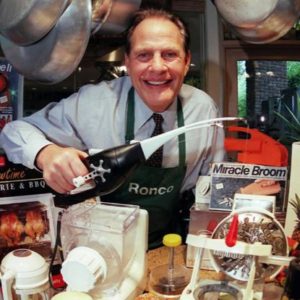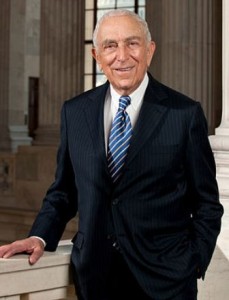Salesmen of the Century
Samuel Popeil (1915-1984) was born in New York, the son of Jewish immigrants from Eastern Europe. His uncle, Nathan Morris, was a successful salesman and took Popeil on as an apprentice. In 1945, Popeil moved to Chicago to start a kitchen gadgets business with his brother. Soon, Popeil had ideas for better product designs and invented a number of his own kitchen gadgets, including a juice extractor, sandwich pie-maker, and donut maker. Together with his creative marketing and sales pitches, business for Samuel Popeil soared rapidly.
His son, Ronald Popeil (b. 1935) started working in his factory at just 13. By 17, he started his own business selling his father’s gadgets, despite the two having a poor relationship. Ron quickly became a top salesman, making over $500 a day in his late teens. By 1958, he began selling his father’s inventions on television, starting with the “Chop-O-Matic”. With his novel – and now classic – sales pitches (“But wait, there’s more!” and “If you order now…”) the Chop-O-Matic quickly sold over 2 million units. (Click here to see Ron Popeil’s 1959 Chop-O-Matic commercial.) Following this success, Samuel produced the Dial-O-Matic, Whip-O-Matic, Mince-O-Matic, and then its most popular invention, 1963’s Veg-O-Matic, which sold 11 million units. Many more gadgets were made as the company slowly faded away, and was sold and liquidated in 1979. Samuel Popeil died five years later, and Ron’s own company, Ronco Teleproducts, went bankrupt. Ron didn’t stop there, though, and rebuilt the kitchen gadget empire with his own inventions and products, like the Beef Jerky Machine and Giant Dehydrator. Most popular of all was the Showtime Rotisserie and BBQ. Inspired by seeing a long line-up at Costco for rotisserie chicken, Ron spent a great deal of time crafting a small, kitchen-friendly machine, and ended up filing twelve different patents for his unique rotisserie design. His work paid off, with the Showtime Rotisserie bringing in over a billion dollars in sales – primarily through Ron’s 28-minute infomercial – and becoming America’s best-selling kitchen appliance. Ron Popeil would go down as America’s “Salesman of the Century” (also the title of his autobiography). When awarded the 1993 Ig Nobel Prize in Consumer Engineering, Ron was described as having “redefined the industrial revolution”. He has appeared (or been parodied) in countless songs, books, films and TV shows. Ron sold his company for $55 million in 2005 so that he could spend more time with his family, yet still works as an inventor and salesman, never abandoning his passion.
Words of the Week
Achieving life is not the equivalent of avoiding death.
– Ayn Rand



